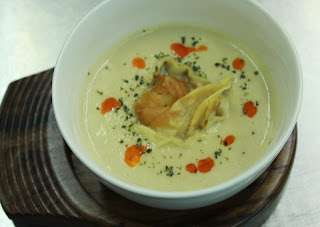A Matter of Taste: Unfamiliar Foods
In
the James Bond movie “Octopussy”, Roger Moore,
a.k.a., 007, is captured
by the villain, an Afghan prince named Kamal Kahn. Seated at the
dinner table with his evil host, James Bond is revolted by the stuffed
sheep’s head glaring at him from his plate. In gastronomic horror he
watches Kahn twist out one of the creature’s eyeballs and gloriously pop
it into his eager mouth. Bond refuses to partake claiming he “loses
his appetite when he’s stared at.”
The foods that people
choose to eat or not to
eat is an interesting subject of study. If
humans developed in a vacuum, free of all external influences, we would
probably consume what naturally appealed to us. There are underlying
biological reasons, (biochemistry, genetics, taste bud anatomy, etc.),
that create individual differences in taste preferences. If we were
without our feelings we might choose our victuals much like Spock, the
emotionless Vulcan of Star Trek: based purely on nutritive value. But we
have not grown up in a vacuum nor are we passionless automatons.
We become accustomed to certain foods based on our life experiences.
People have a natural reluctance toward foods and food combinations that
are unfamiliar. My father loves veal cutlet and loves eggs, but place
the eggs on the cutlet, (as in the classic German dish wiener
schnitzel), and he recoils and makes a face. I make a delicious salad
from mixed greens, asparagus, and potatoes topped by a green onion
dressing. My mother, who likes potatoes, didn’t eat them, simply
because she “never heard of putting potatoes in a salad.” Go to the
Internet, put “salad with potatoes” in the search box, hit enter, and
watch reality contradict her experience. But that’s not the point. It’s
not objective reality that matters; it’s her reality that matters.
If my anti-potatoes-in-salad-mother grew up in Southeast Asia, she’d be
eating fried rats and insects. But one needn’t traverse half way
around the globe to encounter unusual foods. Growing up in northern NJ,
my Italian friend’s father would bring home a goat at Christmas. He
would eat numerous parts of the animal including the brains. I certainly
have my own limits. I sautéed veal kidneys to perfection in cooking
school but I refuse to eat an organ involved in an animal’s urinary
process. I did however try the
frog’s legs
and yes they do taste a little like chicken. My mouth was saying “Hmmm,
not bad”, but my brain was saying, “IT’S A FROG!” If kidneys or frogs
legs had been a staple in my childhood, I probably would feel
differently about consuming them.
During a trip to
Montreal years ago I treated myself to a top notch French restaurant
each day. I had wild boar, caribou, and
ostrich
and enjoyed them all. These delicacies are mildly adventurous at best.
They were all reminiscent of tender beef loin and being an ardent
carnivore, it wasn’t a great leap. I tried the escargot but my reaction
was the same as the frog’s legs: tasted good but IT’S A
SNAIL!
Some people avoid certain foods for religious reasons, their value
system, or for health concerns. That’s understandable. But some also
avoid certain foods purely out of misinformation. I’ve encountered
individuals, who believe black pepper sticks to your appendix, eating
peanuts after sundown causes stomachaches, fluids shouldn’t be consumed
with meals, eating sugar causes diabetes, and schizophrenia is due to a
vitamin deficiency. And then there’s the minority whose sanity needs to
be questioned. One fanatical woman I knew was incensed about the
“evils” of sugar. One day after her church services the local school
teacher was handing out lollypops to the children. This woman actually
ran through the parking lot snatching the candy from the children’s
hands.
Avoiding certain foods because of your values or
your health is one thing. But when foods are avoided simply due to a
lack of experience, erroneous information, or mental aberrations, then
we are placing arbitrary, irrational, or unnecessary limitations on the
joys life has to offer. I am not recommending that you start frying
grasshoppers, (as in Thailand and Mexico), consume
mountain oysters,
(steer testicles), or drink seal blood, (like the Eskimos). But I am
hoping you will be open to analyzing and expanding your dietary gamut. I
don’t think putting an egg on a veal cutlet, or eating potatoes in a
salad is a radical course of action.
Expanding your culinary horizons provides three benefits:*
1)If your diet is already restricted for health purposes or your value
system, then you may need to increase your repertoire to combat boredom
and monotony.
* 2)There are many foods high in nutritional value outside the scope of our usual regime. (Spock would agree with this one).
*
3)Finally, and this is my favorite given my hedonistic orientation,
broadening your palate will result in greater pleasure. The more things
you like, the more you can enjoy the simple act of eating.

















































